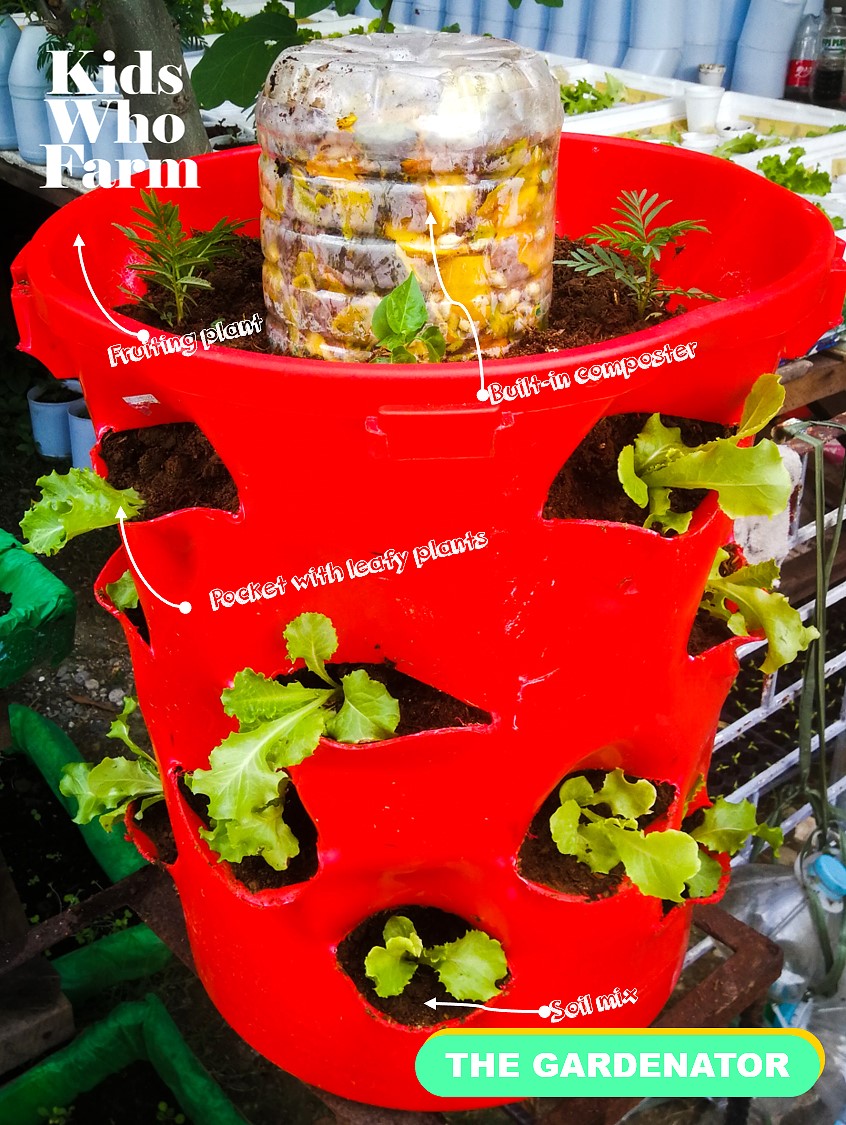Teaching young people how to farm early in life
By Henrylito D. Tacio
By teaching today’s young people the basics of vegetable gardening, farming skills, and other necessities in life, a non-governmental initiative believes they will have a brighter future in their lives.
“Our main target audience are mainly the youth,” explained Moncini “Muneer” Hinay. “Our mission is to provide a platform for them to participate in local food security solutions. In the process, we also engage children because our programs involve collaboration with schools and primary educational institutions.”
Hinay is the president and co-founder of Kids Who Farm Sustainable Food Systems, Inc. or Kids Who Farm (KWF), a Zamboanga City-based organization that aims to inspire future farmers by educating the youth on the importance and value of food and farming.
Gardening
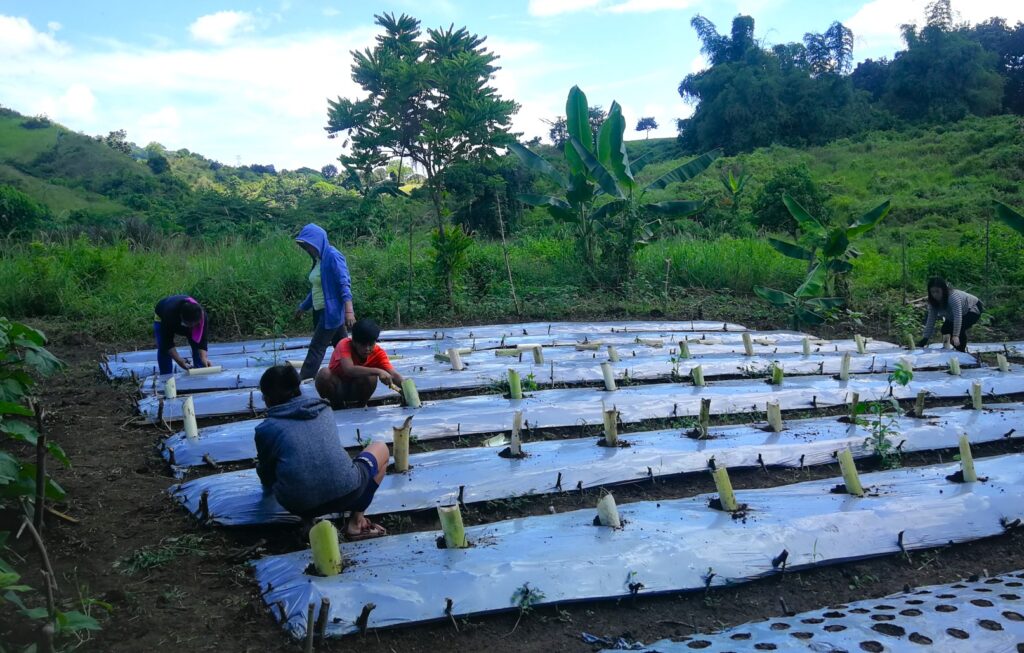
Actually, KWF originated from the innovative vision of his daughter, Raaina Hinay, who conceived the idea at the tender age of nine in 2019. Automatically, she becomes the co-founder. “She recognized the necessity for a shared source of fresh produce to support the supply of the school canteen and to facilitate feeding programs for the young learners at Catalina Vda De Jalon Memorial School in barangay Tumaga,” he recalled.
This concept motivated the father to launch KWF initially as an advocacy effort, which subsequently evolved into a non-profit startup organization. The core team consists of enthusiastic youth volunteers, young professionals, and community leaders within the city of Zamboanga.
Getting young people to farm
“We believe that the future of food security depends on the anticipated participation of young people in food and farming, that’s why we engage the youth in meaningful and impact-driven community food security initiatives,” Hinay said.
KWF is very timely. Currently, studies indicate that the average age of farmers in the country falls between 55 and 59 years. Experts forecast that the nation will encounter a significant shortage of farmers within the next 10 to 12 years.
During his time, Jose P. Rizal said, “The youth is the hope of the fatherland.” This statement reflects his conviction in the capabilities and promise of younger generations to enhance the welfare of the nation.
“There is an urgent need to inspire future farmers and make sure that our youth are trained and equipped to engage in food and farming as well cultivate food citizenship among the youth,” Hinay said. “We need more than ever young people who are aware of the impacts of their food choices on the planet, society and economy and have empathy towards food.”
Involvement of schools
To achieve these goals, KWF teaches children and young people the basics of urban container gardening, hydroponics, composting, agro-entrepreneurship, and financial literacy, working in partnership with both public and private educational institutions. Teachers and parents are also involved by collaborating with them through the General Parents-Teacher Associations.
Growing Radish
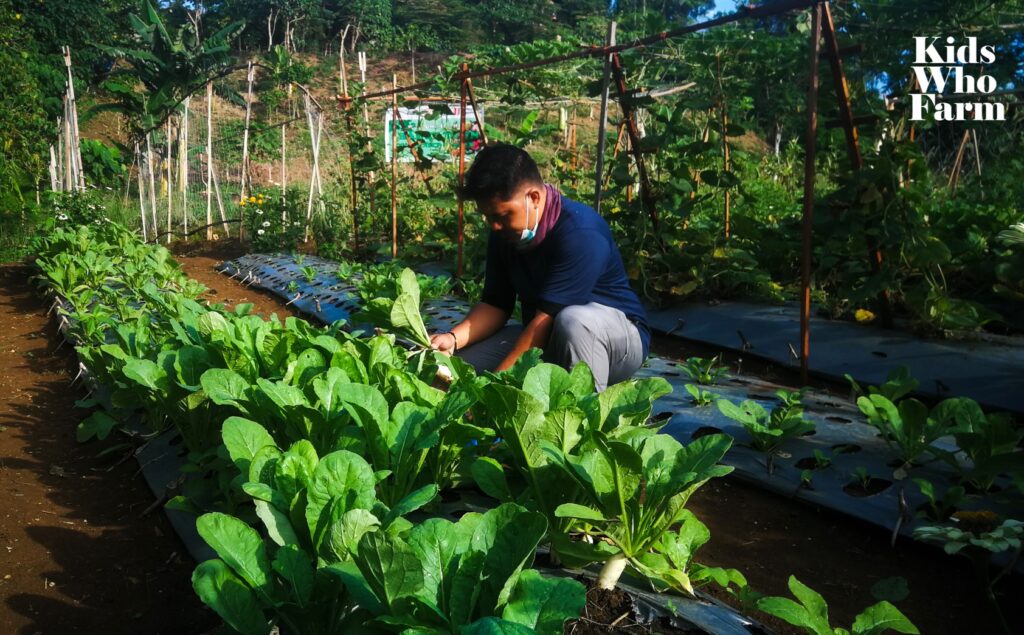
KWF also offers training in vegetable gardening as a strategy to combat malnutrition in children. Recent research indicates that one in two pre-school children from the lowest 20% of the population in the country experience stunting, meaning they are significantly shorter than the international standards for their age and height.
According to Hinay, the selection of vegetables for cultivation is tailored to meet the specific needs of the community. “Most of the starter crops are leafy vegetables like pechay, mustard, kangkong, lettuce and indigenous veggies like talinum. We also recommend pinakbet crops like squash, eggplant, and string beans. These are mostly what they consume and what the community needs,” he said.
KWF has successfully broadened its initiatives beyond Zamboanga City. In Bukidnon, for example, KWF engages the youth in agriculture by implementing a “Grow House,” which facilitates small-scale production through Hydroponics technology, allowing for vegetable cultivation with minimal reliance on pesticides and soil.
“This approach differs from conventional farming, as it allows young farmers to cultivate their own food without the extensive exposure to sunlight or the risk of soiling their clothes from strenuous labor. Our goal is to make farming more appealing in order to change the perceptions of the youth. It is essential that we encourage greater participation in efforts to achieve global food security,” said Maydene Demesana, the Grow House Officer-in-Charge at the Jesuit Bukidnon Retreat House.
Core values
As an organization, KWF adheres to fundamental values such as respect, which emphasizes treating all individuals with dignity and honor. Integrity is another cornerstone, reflecting a commitment to maintaining the highest moral standards at all times. Volunteerism is a key principle, highlighting the importance of dedicating time, energy, and resources to support, empower, and sustain communities.
Growing Kangkong
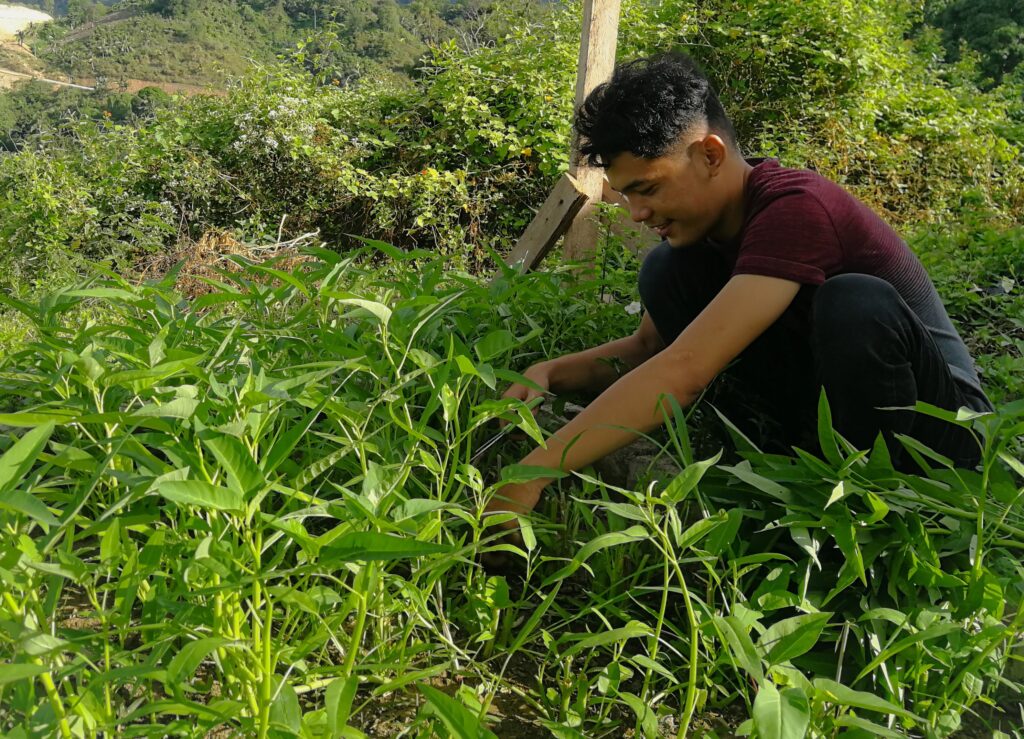
In addition, KWF promotes creativity and innovation. According to Hinay, the organization is committed to seeking new, imaginative, and innovative solutions while fostering the ideas of others to adapt and thrive in a dynamic and climate-influenced global landscape.
Inclusiveness is yet another essential value that KWF instills in its members. The organization ensures equal access to opportunities and resources for individuals, irrespective of their age, gender, social status, religion, political beliefs, or background.
Essential programs
One of KWF’s crucial programs is Hyperlocal Food Network. “This program aims to establish youth-led community gardens and school microfarms so that food-secure future cities will be realized,” Hinay said. “We also want to empower the youth as the next generation of food producers by building their expertise in food and farming through capacity development interventions and community involvement.”
So far, KWF has established 40 community food gardens and school microfarms in 25 barangays in Zamboanga City, two in Cagayan de Oro City, one in Bongao, Tawi-Tawi, 6 in Bukidnon, and 3 in Davao City. “We have mobilized 180 youth volunteers in community microfarm establishment and trained over 6,000 individuals in urban agriculture technologies.”
Another core program KWF promotes is Kids Can Compost. This flagship program aims to tackle the pressing issue of food waste and provide circular solutions. “We advocate doable and replicable technology solutions to managing and reducing food waste through education, information campaigns, and introduction of the food loop home-based food production system,” Hinay said. “We also engage local partners and communities in composting technologies.”
KWF is looking forward to the fact that by 2025, 50% of the households in Zamboanga City will have their own circular food loop using the so-called Gardenator technology in composting household food waste and hyperlocal food production. By doing so, food waste disposal in the landfills will be significantly reduced.
Letuce Farming
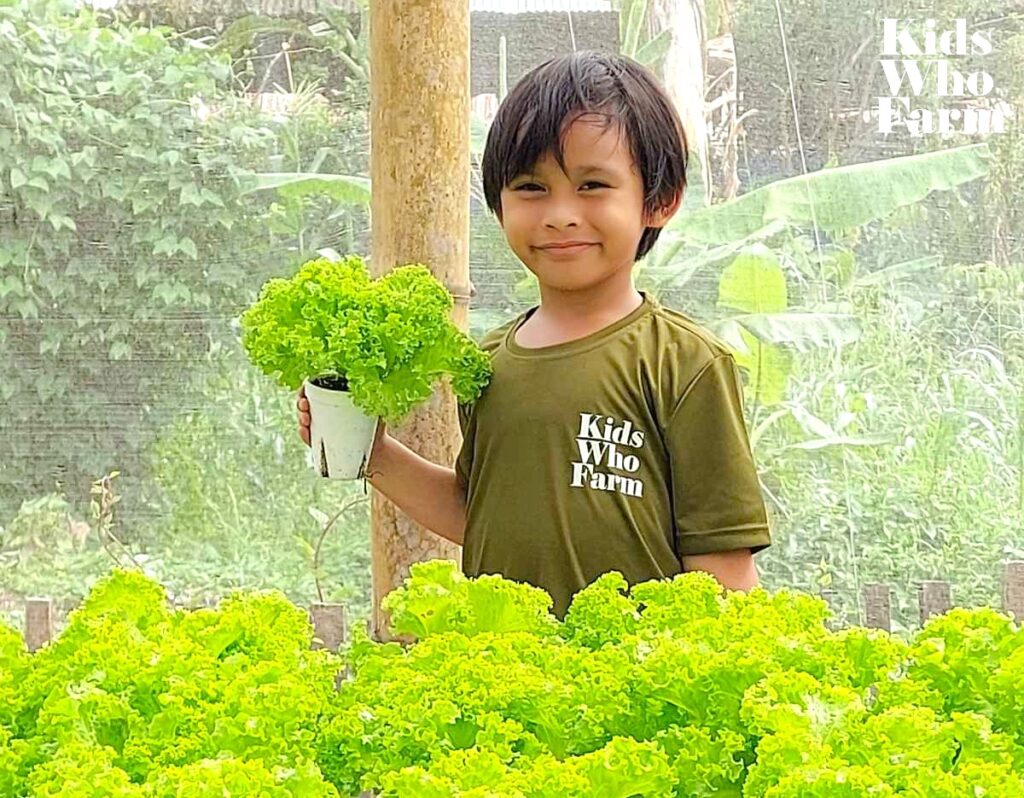
Still another important initiative is the Hyperlokal Kapital Community Savings Club (CSC). “Formal financial institutions are not always able to meet the needs of many Filipinos, particularly marginalized communities and sectors who live in remote areas,” Hinay said. “Nonetheless, everyone including the youth needs financial literacy, access to small amounts of savings and loans to help them improve their incomes, make timely investments and cope with emergencies.”
Hinay sees CSC as one possible solution. “The CSC is the first step to financial inclusion as it provides a mechanism to save money while building financial knowledge and skills,” he said.
A CSC is a community-based, self-managed and independent group that mobilizes and manages its own savings through purchasing shares and taking small loans from those savings. The activities run in cycles for one year, after which the accumulated savings and the loan profits are distributed back to the members in proportion to their savings.
The KWF has organized 18 CSCs in Zamboanga City, Bulacan, Manila and Cavite, mobilizing a total of 1,500,000 worth of savings for hyperlocal access to capital for livelihood activities and personal planned expenses.
KWF has produced some modules for these core programs. “We shared our training modules to schools so that they can adopt and make the learning program a part of the subject,” Hinay said.
He cited the case in Davao City, where KWF works with the Holy Child College of Davao. “We trained the students on urban agriculture technologies and after the training they established their microfarm as a learning site for the students. We also encouraged them to implement gardening in their respective homes after they learned from the training,” he said.
“For the youth, the training is aimed at equipping them to be competent volunteers who will also train community residents in our partner barangays and communities,” Hinay added.
Already, KWF has a partnership with the Global Shapers Davao to establish a school microfarm and train elementary children at San Roque Central Elementary School in Barrio Obrero of Davao City.
Kids Who Farm is already making waves in Zamboanga City Garden Attack! Just recently, it collaborated with the Luyahan Rural Improvement Club – Women’s Association to impart urban microfarming and composting technologies using the Gardenator among the participants.
Father and Daughter
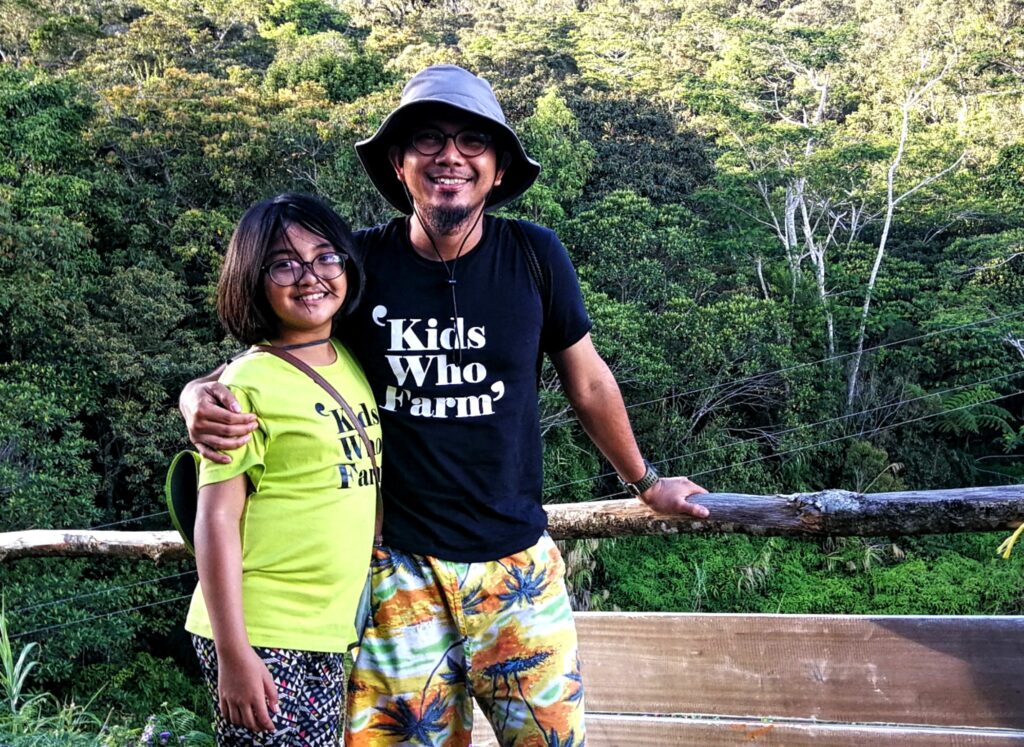
“We are doing this to make food accessible and food waste management easy for low-income households in barangay Pasonanca,” Hinay said.
Other advocacies
KWF is imparting knowledge to children and young individuals that extends beyond just farming and gardening. During the “Climate EmerGenz: Empowering a Generation for Climate Action” event, organized by the Zamboanga Hub in collaboration with the Ateneo de Zamboanga University American Corner of the Young Southeast Asian Leaders Initiative, KWF presented its narratives and advocacy related to climate action.
“The event successfully gathered and involved senior high school and college students from the city, providing them with insights into climate change and the importance of climate action,” Hinay said.
The lives of some young individuals who became part of KWF have significantly improved. Diowella Ann Ponteras was among those selected by the Education Development Center, a global nonprofit organization dedicated to fostering sustainable solutions that enhance education, promote health, and broaden economic opportunities, to participate in a summit held in Manila.
At this summit, she expressed that young people have the potential to be influential, leveraging their mobile devices to connect with extensive networks of peers. She further remarked that by making the learning process regarding climate issues engaging and applicable, young people will be more inclined to listen and eager to participate.
Funding and future plans
KWF gets its financial sustenance from corporate partners, crowdfunding or donations, logistic support from the Department of Agriculture, and consultancies. It also participates in hackathons and grant competitions.
In response to inquiries regarding their future objectives, Hinay stated, “Our intention is to broaden our scope and extend our reach to additional cities and communities in Mindanao. We aim to consistently forge strategic partnerships and collaborations with both the government and the private sector, enabling us to empower a greater number of young individuals and foster a positive impact within the community.”

